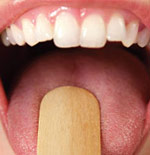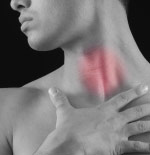Laryngopharyngeal Reflux (Acid Reflux) (LPR)
Normally, when you swallow, food goes one way, from the mouth, through the esophagus, into the stomach. There in a one-way valve at the junction of the esophagus and the stomach, called the lower esophageal sphincter. In GERD and LPR, it is thought that this sphincter is malfunctioning, allowing stomach contents to travel (or reflux) back up in to the esophagus. In the case of GERD, the refluxed contents (refluxate) stays in the esophagus. In patients with laryngopharyngeal reflux (LPR), stomach contents travel back up and out of the esophagus. The acidic contents coats and damages the larynx, causing the signs and symptoms of LPR.
Singers and other professional voice users are particularly prone to LPR. The constant pressure in the abdomen from supporting your sound increases the likelihood of refluxing. This can result in changes in the pitch of your voice and predispose you to injury. Also, reflux causes you to clear you throat chronically, which can injure the delicate lining of the vocal folds.
Common signs and symptoms of LPR
Often, patients with LPR are unaware of their condition and are surprised by their diagnosis because they do not know the symptoms.
Common symptoms of LPR include:
- Hoarseness
- Chronic cough
- Throat clearing
- Sensation of an object in your throat (globus sensation)
- “Post-nasal drip”
Treatment of LPR
There are several things you can do to help treat LPR. Lifestyle modifications are ways that you can change your diet, your sleeping habits, and your daily life to help minimize the creation and reflux of acid. For example, elevating the head of your bed, reducing LPR triggers (i.e., chocolate, alcohol, high-fat or acidic foods), and changing the timing of your meals can all improve your symptoms.
The only definitive way to treat LPR is surgical. Unless the broken one-way valve is repaired, you will continue to reflux stomach contents into your esophagus and onto your larynx. However, the good news is that if lifestyle modifications fail, there are still medications available to make the refluxate less damaging to the sensitive lining of your larynx.
By preventing your stomach from producing acid, the reflux contents are neutralized, and therefore significantly less damaging to your larynx. The medications that do this are called proton-pump inhibitors, because they stop the stomach’s acid producing pump.
Virtual & Office Appointments Available





